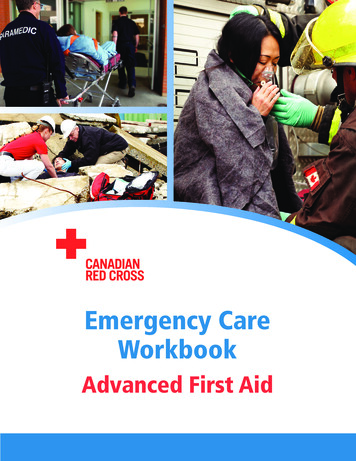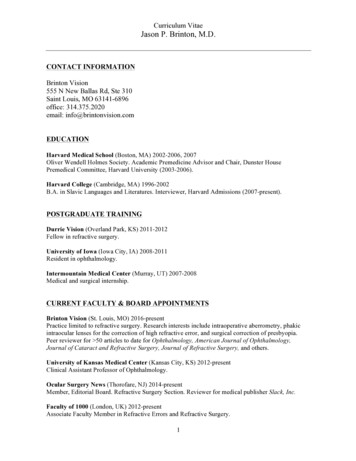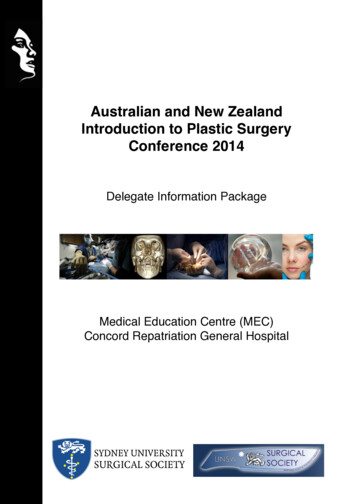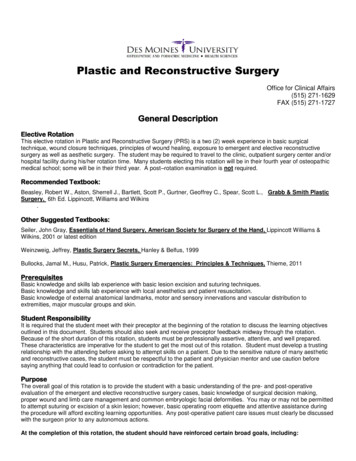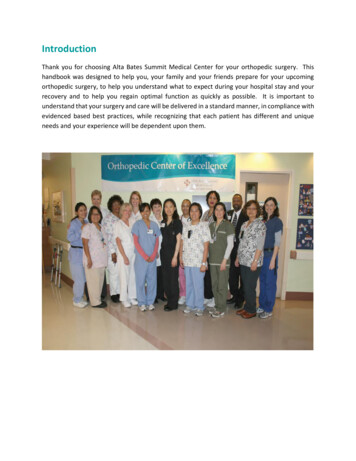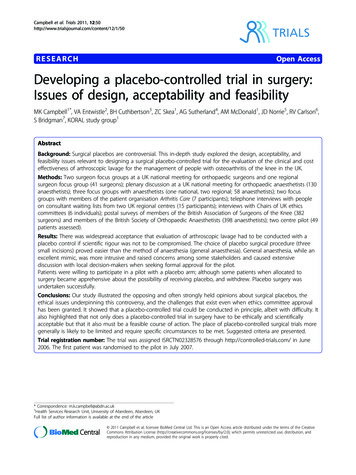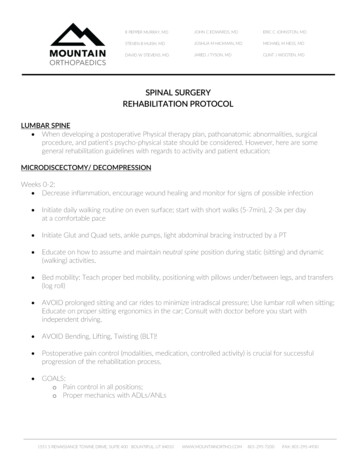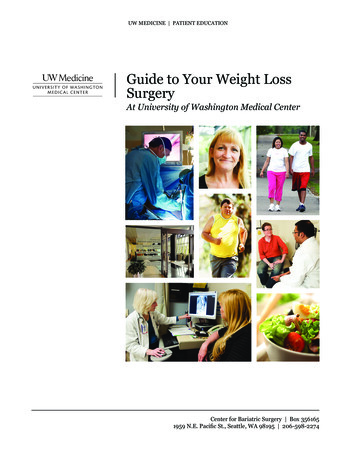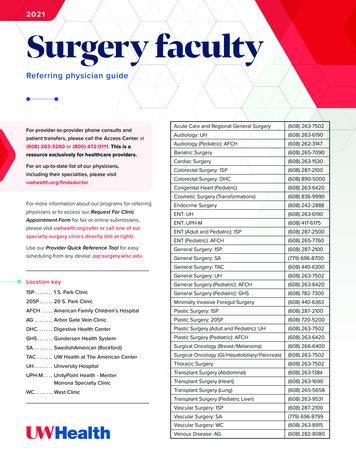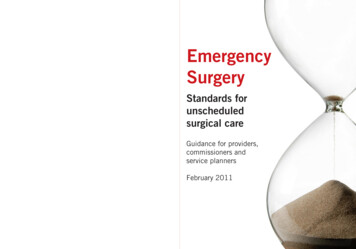
Transcription
›› Patients receive safe and high quality care and have the best care experience possible.›› Services are delivered in a timely manner, with acutely ill patients prioritised overelective surgical care.›› Services achieve the best possible clinical outcomes and follow established principles.›› Services provide information and support to patients and their supporters at all stagesof the pathway.›› Services are provided by appropriately trained and competent healthcare professionals.›› Services are structured to deliver training in an efficient manner and ensure thatthe competing demands of training and service provision are adequately balanced.›› Services contribute towards the collection and collation of data to supportevidence-based care.›› Facilities and resources are adequate and easily accessible.›› Services are efficient, effective and offer value for money.EMERGENCY SURGERY: STANDARDS FOR UNSCHEDULED CAREThis document aims to provide information and standards on emergency surgical serviceprovision for both adult and paediatric patients. It is aimed at commissioners, planners,providers and others involved in the provision of emergency surgical care and seeks toensure that:EmergencySurgeryStandards forunscheduledsurgical careGuidance for providers,commissioners andservice plannersFebruary 2011www.rcseng.ac.uk Registered charity no 212808FEBRUARY 2011The Royal College of Surgeons of England35–43 Lincoln’s Inn FieldsLondon WC2A 3PE
Produced by the Publications Department, The Royal College of Surgeons of EnglandPrinted by Hobbs the Printers, Southampton, UK.Professional Standards and Regulation DirectorateThe Royal College of Surgeons of England35–43 Lincoln’s Inn FieldsLondonWC2A 3PEThe Royal College of Surgeons of England 2011Registered charity number 212808All rights reserved. No part of this publication may be reproduced, stored in a retrieval systemor transmitted in any form or by any means, electronic, mechanical, photocopying, recording orotherwise, without the prior written permission of The Royal College of Surgeons of England.While every effort has been made to ensure the accuracy of the information contained in thispublication, no guarantee can be given that all errors and omissions have been excluded. Noresponsibility for loss occasioned to any person acting or refraining from action as a result of thematerial in this publication can be accepted by The Royal College of Surgeons of England andthe contributors.
ContentsContributors.iiForeword . 1Executive summary. 2About this document. 4Purpose. 4Context. 4Structure and content. 6Section 1: Background. 71.1 What is emergency surgery?. 71.2 How common is emergency surgical intervention?. 71.3 How can outcomes and productivity be improved? . 71.4 What are the common issues? . . 81.5 The case for change. 121.6 Models of care. 131.7 Planning and commissioning . 16Section 2: Standards for unscheduled surgical care (generic). 182.1 Provision of the emergency surgical service. 182.2 Leadership and governance. 232.3 Patients and supporters. 252.4 Education and training. 272.5 Network cooperation. 28Section 3: Supporting unscheduled surgical care (specialty-specific standards). 293.1 Ambulance services. 293.2 Emergency department . 303.3 Acute medicine . 323.4 Radiology. 353.5 Pathology. 373.6 Anaesthesia . 423.7 Intensive Care. 463.8 Discharge, ongoing care and rehabilitation. 48Section 4: Delivering unscheduled surgical care (surgical specialty standards . 494.1 General surgery. 494.2 Emergency surgery in children. 534.3 Specialist paediatric surgery . 564.4 Trauma and orthopaedic surgery. 574.5 Plastic surgery. 614.6 Urology. 644.7 Neurosurgery. 654.8 Oral and maxillofacial surgery. 664.9 ENT. 674.10 Cardiothoracic surgery. 70Glossary. 71Further reading. 73References. 76i
ContributorsMr Richard Collins, Vice President, Royal College of Surgeons, ChairDr Shuba Allard, Royal College of PathologistsMr Iain Anderson, Association of Surgeons of Great Britain and IrelandDr Stephen Barasi, Patient Liaison Group, Royal College of SurgeonsMiss Su-Anna Boddy, British Association of Paediatric Surgeons and Royal College of Surgeons’Council Lead for Children’s ServicesMs Sarah Cheslyn-Curtis, Association of Surgeons of Great Britain and Ireland/British Associationof Paediatric SurgeonsDr Carol Cobb, Royal College of PhysiciansMr Graham Cooper, Society for Cardiothoracic SurgeryMrs Jo Cripps, Royal College of SurgeonsMrs Jane Curley, British Association of Otorhinolaryngologists, Head and Neck SurgeonsMr Daren Forward, British Orthopaedic AssociationMr Philip van Hille, Society for British Neurological SurgeonsMr Hamish Laing, British Association Plastic, Reconstructive and Aesthetic SurgeonsProfessor Chris Moran, British Orthopaedic AssociationMr Don MacKechnie, College of Emergency MedicineMr David Macpherson, British Association of Oral and Maxillofacial SurgeonsDr Tony Nicholson, Royal College of RadiologistsDr Carol Peden, Intensive Care SocietyDr Marilyn Plant, Royal College of General PractitionersDr Ossie Rawstorne, Great Western Ambulance Service NHS TrustLt Col Zaheer Shah, British Association of Urological SurgeonsDr Nick Sherwood, Royal College of AnaesthetistsMs Karen Wilson, Care Quality CommissionMr Mike Zeiderman, Royal College of Surgeonsii
ForewordThose requiring emergency surgical assessment or operation are among the sickest patientsin the NHS. Often elderly, frail and with significant co-morbidity, the risk of death or seriouscomplication is unacceptably high. We, the professionals involved in delivering this care, believethat emergency surgical care can be delivered in a far safer and more efficient manner, bringingbenefits to our patients and their families while also providing excellent training and an efficientuse of resources.I have had the pleasure of chairing a working group over recent months that comprised medicalroyal colleges and specialty associations, regulatory organisations and, importantly, patientrepresentatives. We have sought to develop standards and guidance for commissioners andservice planners so that they can ensure the provision of high quality surgical services foremergency patients across the UK. The specialty standards contained within this document aregeneric in nature – more detailed guidance is available from the relevant college or specialtyassociation as indicated throughout.In England, I hope that this document will be used to full effect as significant changes to thecommissioning structure are introduced. While the details are as yet unclear, we can foreseethat the commissioning of emergency surgical service provision may need to occur at a regionallevel via sufficiently sized consortia of commissioners to ensure adequate coverage, consistencyand accountability. We wish to facilitate constructive working between service managers andclinicians in order to achieve the best possible outcomes for patients. We look forward to workingwith the Department of Health to ensure its proposals can be implemented in a safe and efficientmanner.I would like to thank the working group for bringing this work to fruition. I hope you will find thisdocument useful. I certainly commend it to you as a vital tool to support the delivery of a highquality and efficient service that focuses entirely on the patient who, at the time of requiringemergency surgical management, will be at their most vulnerable.Richard CollinsVice President, Royal College of Surgeons.Chair, Emergency Surgery Standards Working Group1
Executive summary›› The delivery of emergency surgical care is currently sub-optimal. There has been a lack ofinvestment in, and understanding of, the risks of this type of surgery and the associatedworkload.›› Mortality varies two-fold between units for surgical emergencies. In general surgery aloneemergency cases account for 14,000 admissions to intensive care in England and Walesannually, carrying a mortality rate of over 25% and intensive care costs of at least 88million.1›› Commissioners, planners, providers and clinicians need to understand the specificrequirements of patients receiving unscheduled surgical care and to ensure pre-, peri- andpost-operative assessment arrangements are improved in order to secure better outcomes.›› This report is the result of a working group comprising experts from all surgical and relatedspecialties.›› This report is aimed at commissioners, planners and service providers.›› It provides standards for the care of unscheduled adult and paediatric surgical patients. Thestandards describe how a safe, responsive and high quality surgical service can be providedby prioritising the care of this group of patients.›› The key elements of a high quality emergency surgical service are:»» Dedicated clinical and managerial leadership and effective multidisciplinary teamworking.»» The prioritisation of acutely ill patients over elective activity.»» A defined governance structure with a focus on outcomes, audit and regular review ofpractice.»» A consultant-led service across all specialties.»» Acknowledgement that care of acutely ill patients should be prioritised in the training ofsurgeons and other clinicians involved in unscheduled care.»» The availability of sufficient, suitably trained and competent staff throughout thepatient’s pathway.»» The presence of agreed protocols to assess and manage risk, matching the seniority ofthe attending clinician with the clinical needs of the patient.2
»» Timely input of senior decision makers (Certificate of Completion of Training holders(CCT holders)) according to the needs of the patient.»» Appropriate and adequate facilities, laid out in such a way as to provide safe andexpeditious patient care in the acute setting.»» Careful planning and provision of adequate resources to enable sufficient and timelyaccess to emergency theatres.»» Appropriate pre- and post-operative care arrangements, including the early involvementof anaesthetists and critical care specialists and resources where required.»» A focus on patient-centred care, which involves consultant-led communication withpatients and their supporters.3
About this documentPurposeThis document aims to provide information and standards on emergency surgical serviceprovision for both adult and
Surgery Guidance for providers, commissioners and service planners February 2011 Standards for unscheduled surgical care EMERGENCY SURGERY: STANDARDS FOR UNSCHEDULED CARE FEBRUARY 2011. Produced by the Publications Department, The Royal College of Surgeons of England Printed by Hobbs the Printers, Southampton, UK. Professional Standards and Regulation Directorate

